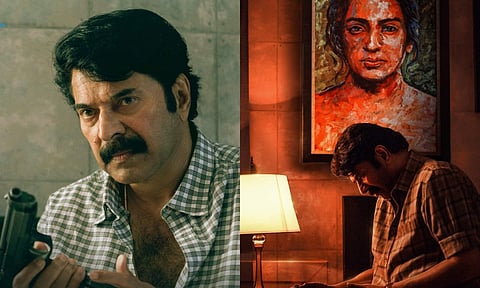Puzhu Movie Review: Mammootty brings out his most chilling turn in ages
Rating:(3 / 5)
Imagine living with the knowledge of a stubborn venomous serpent coiled under your bed for many days with no intention to move out. What if, one day, this creature told you that it has no intention of harming you and you can safely go to bed every night without worrying about a sudden hit? Mammootty's nameless character -- referred to by his friends as Kuttan -- in Puzhu carries this quality. And after seeing how this man behaves throughout the film, I wondered whether Paambu would've been a more apt title than Puzhu.
Director: Ratheena
Cast: Mammootty, Parvathy Thiruvothu, Appunni Sasi, Kottayam Ramesh
Streaming on: SonyLIV
Mammootty moves in Puzhu with the demeanour of a man walking through a nightmare. And when he pulls everyone around him into it, he becomes a nightmare himself. A toxic upper-caste dinosaur, Kuttan is relentless when tormenting those he considers beneath him or his caste. He can't digest the thought of his sister (Parvathy) being romantically involved with a lower caste man, Kuttappan (Appunni Sasi). Watching Kuttan is like reading a chapter on a particular kind of psychotic behaviour. Every day, he subjects his son to rigorous, military-like routines and argues about tomato being a vegetable ("Why do you believe everything Google says?" he asks). At night, he forces his son to watch a videotape of his deceased mother during much happier times. It's as though a dark, twisted version of Pappayude Swantham Appoos is being played out. Mammootty was the right man for this role. No doubt.
In my review of Bheeshma Parvam, I wrote that Mammootty's performance brought back memories of watching his 1990s films like Kauravar, Vatsalyam and Valyettan. Puzhu, too, has this nostalgia-inducing quality. The infinitely disturbing and menacing turn in Puzhu recalled the days when I watched him in films like Kariyilakkaattu Pole, Thaniyavarthanam, Vidheyan, or Bhoothakkannadi. Oddly enough, Puzhu also brought back the memory of being haunted by a Mohanlal film, Aham, about a man with OCD, among other issues.
Puzhu presents Mammootty in his most chilling avatar since Munnariyippu. If asked to rate these two films on the creep-o-meter, I would place Puzhu on top. Mammootty stuns with a multilayered portrayal that, upon introspection, reveals tiny nuances that we may not have thought of initially. You notice something happening on his face even when it's out of focus. These clever touches are particularly evident in the scenes with the son. Puzhu manages to terrify with moments both seen and unseen. At least three scenes -- involving an ageing suspect, a dog, and a trophy -- deeply shook me up. And Jakes Bejoy's eerie, violin-heavy score adds to the mounting dread.
But then the film does something in its third act, which infuriated me. It strays off course to focus on something else. It makes one ask, "Wait, where did this come from?" It's not the idea that annoyed me but its inclusion and staging because it doesn't feel organic or subtle as it did with Kuttan's interactions with his previous victims. When one is required to suspend disbelief momentarily in a film like this, it's jarring. Since Puzhu already comes with an air of self-importance -- that it is above the usual mainstream fare -- one expects a relatively more cohesive narrative. It's like someone giving you a gift and then taking it back.
Puzhu suffers from the ailment that films like Varthamanam (another Parvathy-starrer) or Angry Indian Goddesses did. They hope to bite off more than they can chew. (The former even slyly managed to push a tiny bit of propaganda.) This is why I find a loud film like Jana Gana Mana, which was also loaded with multiple issues, much easier to digest because it had no pretension about its goals. There was an organic quality to how it hopped from one issue to another. It was all part of a single thread. Of course, some will disagree with me about the lack of subtlety, but then that film was a big-scale entertainer intended for a wider audience and it effectively put across its thoughts despite being preachy. Can we say the same thing about Puzhu, though?
Bringing in the issue of one particular community in the third act dilutes the impact of whatever the film was doing up until that point. Sure, it needs to be discussed, but Puzhu feels like it wants to be two different films at once. (Keen cinephiles will note a few similarities to the Michael Haneke film, Cache.) Why not focus on a particular issue at a time? Suddenly, the film begins to reek of insincerity.
It even gets a bit theatrical towards the end. This is aside from its repeated attempts to drive home the point, continuously, with a stage play of Kuttappan. Yes, we get what the worm signifies. But was that analogy really necessary? Aren't the base story and characters already strong enough without the forceful inclusion of metaphors? And one is also compelled to ask whether some characters got the closure they deserved. You wonder whether the writers thought of the issues they are going to address first and then built everything around them.
Irrespective of my reservations about the third act, the creators of Puzhu -- writers Harshad, Suhas, and Sharfu; director Ratheena -- deserve a pat on the back for showing us that the actor in Mammootty is unstoppable, regardless of age. If I were to pick the best of his most recent performances, I would unblinkingly add Puzhu to the list that also comprises Munnariyippu and Peranbu. I can't wait to see what he does next, because, right now, his upcoming slate is the most interesting.

